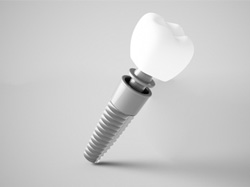Dental Implants — Wellesley, MA
The Gold Standard for Replacing Missing Teeth

People are living longer than ever, and while regular brushing, flossing, and checkups allow many of us to maintain our natural smiles for a lifetime, sometimes our teeth just simply cannot keep up. If you have lost a tooth (or a few teeth) due to injury or disease, dental implants from our Wellesley, MA dentist and oral surgeon can rejuvenate both your smile and your oral health. Dental implants are widely considered the gold standard for replacing missing teeth because of all the unmatched benefits they provide. With this state-of-the-art tooth replacement option, you can eat, smile, and go about your daily life with utmost confidence! Keep reading to learn more and give us a call today to schedule your next appointment.
Why Choose Wellesley Dental Group For Dental Implants?
- Entire Dental Implant Treatment Completed Under One Roof
- Team of Experienced Specialists Ensures Optimal Results
- We Accept Over 200 Dental Insurance Plans
What Are Dental Implants?

An implant is a synthetic tooth root in the shape of a post that is surgically placed into the jawbone. The “root” is usually made of titanium: the same material used in many replacement hips and knees, and a metal that is well-suited to pairing with human bone. A replacement tooth is then fixed to the post. The tooth can be either permanently attached or removable. Permanent teeth are more stable and feel more like natural teeth. In either case, the end result will look, feel, and function just like a natural tooth.
Benefits of Dental Implants

In the past, the only way to replace missing teeth was with a denture or dental bridge. Conventional bridges and dentures are not fixed to the bone, and can therefore be unstable. This can make it difficult to eat or smile with confidence. Implants not only look more natural, but feel and act more like normal teeth, with a stronger biting force. And because they do not directly rely on neighboring teeth for support, implants do not compromise the health of your natural teeth. In fact, bridges are only expected to last seven to ten years, even less with root canals, whereas implants will typically last a lifetime.
Who Dental Implants Can Help

Implants are versatile. If you are only missing one tooth, one implant plus one replacement tooth will do the trick. If you are missing several teeth in a row, a few strategically placed implants can support a permanent bridge (a set of replacement teeth). Similarly, if you have lost all of your teeth, a full bridge or full denture can be permanently fixed in your mouth with a strategic number of implants.
The ideal candidate for implants is a non-smoker who has good oral health, including a sufficient amount of bone in the jaw, and healthy gums with no sign of gum disease. We will meet with you for a preliminary consultation to ensure that dental implants are a good choice for you.
Understanding the Cost of Dental Implants

The upfront cost of dental implants in Wellesley may seem to be quite steep. However, you can rightly view this treatment as a smart investment in your oral health and overall wellness. Implants offer many benefits that are truly priceless. Plus, because we offer some useful provisions that are designed to make paying for your care as easy as possible, you might be surprised by how affordable dental implants really are!
Preliminary Treatments & Dental Implant Surgery

Many patients must undergo preliminary treatments before they can get dental implants. For example, they may need a bone graft, tooth extractions, or gum disease therapy. Each of those services comes with its own price.
The dental implant placement surgery incurs a separate fee. Since we are able to perform this complex procedure right here in our office, you will not have to worry about dealing with the pricing structure of an outside specialist.
The Parts of Your Dental Implant

There are a number of components to the dental implant procedure that can affect cost, including:
- The number of implants needed and the type of restoration used. Logically, a single implant and crown cost less than 4 – 6 implants and a full denture.
- Size and materials. Implants come in different sizes and can be constructed out of various materials (although they are usually a titanium alloy).
- The brand of the implants. We strive to use only top-quality implants from brands we trust.
How Dental Implants Pay for Themselves

With the goal of saving money, some patients choose to get a conventional denture or bridge instead of implants. However, they might actually end up paying more in the long run because traditional dentures need to be replaced every 5 – 7 years or so, and a traditional bridge might last for just 10 – 15 years. The longer lifespan of dental implants makes them a truly excellent monetary value.
Furthermore, dental implants can help you save money by supporting your health. They can lower the risk of oral and systemic problems, thereby sparing you from paying for future treatments.
Does My Dental Insurance Cover Dental Implants?

Some dental insurance policies cover dental implants, whereas others do not. You will have to check the details of your plan to see how it applies. If it does not cover the implants themselves, it is likely to cover your final restoration or preliminary treatments. Our expert team is used to dealing with the nitty gritty details of dental insurance, and we accept more than 200 plans. We will be happy to help you maximize your benefits.
Making Dental Implants Affordable

As an experienced implant dentist, we know that in some cases, patients need a little help to afford their treatment. To that end, we offer some valuable provisions:
- CareCredit. CareCredit is a third-party lending company that offers low-interest and no-interest payment plans to qualified patients. Our team can guide you through the quick application process.
- Essential Dental Plan. This discount plan, which is designed for patients without insurance, provides reduced fees on virtually all the services we offer.
Computer-Enhanced Treatment Planning

We have special software on our computer that allows us to evaluate your dental CT scan in three dimensions for bone quality, bone quantity, and bone location, enabling the best possible placement of your dental implants. This also allows us to work closely and smoothly with your restorative dentist to ensure an ideal result where your dental implants are concerned.
Advanced Dental Implant Procedures

While dental implants can help practically any individual with missing teeth, not everyone is a good candidate initially. Fortunately, just because you are not currently a good candidate for dental implants does not mean you will never be! We are proud to offer a variety of advanced dental implant procedures to help patients overcome obstacles that may be standing between them and their new implant-supported smile. Read on to learn more about a few of these services.
Autogenous Bone Grafting

Occasionally, the ideal areas for dental implants do not have sufficient bone quantity to support the implants. In these cases, it is often necessary to “borrow” bone from another area of your mouth and graft it into the deficient area. Often, the area of choice is from the chin or in the back of the jaw where your wisdom teeth used to be.
Sinus Lift Augmentation

Often the sinuses will enlarge following loss of the upper back teeth. This can preclude placement of dental implants in the upper back areas of the mouth, since the sinus is an air-filled space and dental implants need to be surrounded by solid bone. A sinus lift augmentation/graft is a surgical procedure that restores the sinus cavity to its original size, and replaces the bone that has been lost as a result of the enlarged sinus. This new bone graft typically takes nine to 12 months to heal before the dental implants can be placed into the grafted bone.
Implant Site Development

When a tooth needs to be removed due to infection, it is not uncommon to have lost bone around the infected tooth. In these cases, various types of bone grafting can be done at the same time the tooth is removed to facilitate the placement of a dental implant at a later date.
Maintaining & Caring for Your Dental Implants

Consider your replacement teeth to be the same as natural teeth. Dental implants can accumulate plaque and tartar just as teeth can. They require the same daily brushing and flossing, and the same number of regular checkups. Whether you have just one tooth replaced by an implant or several, a professional cleaning schedule will be necessary to keep your implants healthy. Just like your natural teeth, the better you take care of your replacements, the longer they will last.
Dental Implant FAQs
How Long Do Dental Implants Last?
Dental implants are engineered to last a lifetime. Many patients find that their prosthetic tooth roots endure for well over 30 years.
Of course, the exact lifespan of dental implants can vary greatly from case to case. To make yours last as long as possible, you should stick to good habits. For example, you should visit your implant dentist in Wellesley for regular checkups. A thorough oral hygiene routine is also important.
Are Dental Implants Safe?
Dental implants are generally considered to be safe. They are usually made of medical-grade titanium alloy, which has a reputation for working well within the human body. Very few people have allergies or bad reactions to it.
Our Wellesley team has a strong commitment to patient safety. When we are placing dental implants, we carefully plan the procedure with the goal of minimizing risks. We also carefully screen patients for risk factors that might increase the chance of complications. If you have any such risk factors, we will do our best to help you understand and manage them.
What Can Cause Dental Implants to Fail?
Dental implant failure is uncommon, but when it does occur, it is usually due to peri-implantitis or failed osseointegration. Peri-implantitis, a gum disease usually caused by poor oral hygiene, damages the bone and gums supporting an implant. Failed osseointegration happens when the implant does not integrate with the jawbone, often because of low jawbone density.
Other possible causes of dental implant failure include chronic teeth grinding, tobacco use, certain medications, radiation to the head and neck, and health conditions such as diabetes, cancer, and osteoporosis. Following guidelines from our team can help minimize the risk of implant failure.
How Can I Tell If My Dental Implant Is Failing?
You might have a failing dental implant if you are experiencing:
- Severe pain around an implant
- Inflamed or swollen gums
- The feeling that an implant is loose
- Changes in your bite
You should visit our team as soon as you suspect something is wrong with one of your implants. The earlier you receive care, the more likely it is that the situation can be addressed via conservative means.
How Long Does It Take to Recover from Dental Implant Surgery?
Most patients are able to return to work within a day or two of their surgery. The soft tissue at the surgical sites is usually well-recovered within a couple of weeks. It takes longer for the bone to heal; it might be several months before the implants are fully integrated with your jaw.
